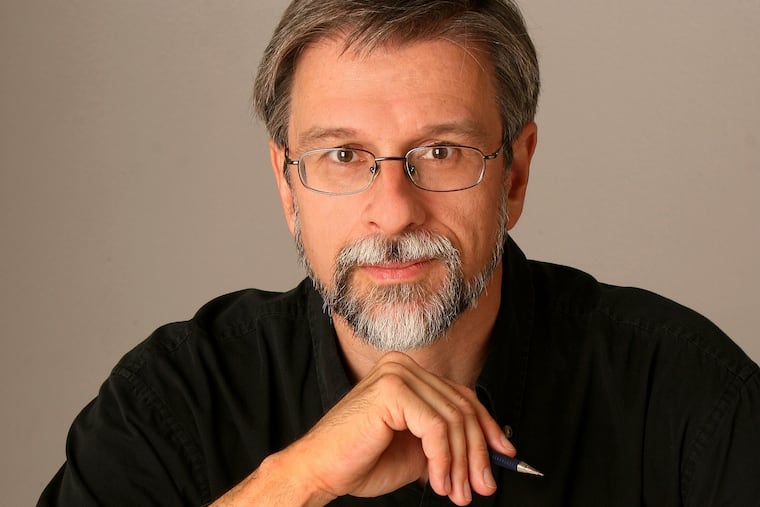Composer and Penn professor James Primosch dies at 64
The Philadelphian wrote for both the church and concert hall, and his work was performed by musical groups locally and nationally.

James Primosch, 64, a stalwart Philadelphia composer, pianist, and longtime University of Pennsylvania professor, died Monday of complications from pancreatic cancer at Penn Hospice at Rittenhouse, said his wife, Mary Murphy.
Dr. Primosch, of Chestnut Hill, wrote music praised for being both sophisticated and genial. Though personally introverted, he formed deep bonds that made him a central player in the Philadelphia music community.
“Pillar is kind of a cliche word, but I don’t think it’s an overstatement,” said Crossing choir conductor Donald Nally.
It helped that he was prolific and worked with a wide variety of forces and genres: orchestra, chorus, solo voice, string quartet and sax quartet, and electronic music. Dr. Primosch also crafted music as readily for amateurs as for professionals.
“He had commissions from the Chicago Symphony Orchestra on one hand and a chorus of regional public high school students on the other, and made music for a lot of people who were not trained at all, including parish choirs,” said Murphy.
For all of his adaptability, however, setting text for voice was probably his strong suit.
“He had a very, very fine sense of the way to fuse words and music,” said composer John Harbison, with whom Dr. Primosch studied at Tanglewood in 1984 and was a friend ever since. “Jim wrote in many cases from the perspective of his very strong and yet questioning Catholic faith, and as such was part of an ancient tradition, sometimes referring to handed-down ancient melodies but more often dealing with the modern Catholic poetry of Denise Levertov, Annie Dillard, and a number of great American poets who share that tradition.”
It was one of these works, Mass for the Day of St. Thomas Didymus, that was included on an all-Primosch recording by the Crossing choir that garnered a 2021 Grammy nomination for best choral performance. In the piece, four soloists sing texts from the Latin Mass while the choir sings Levertov’s cycle of poems.
“It’s a massively complex work but not to the listener at all,” said Nally. “It’s written in a way that you really understand the journey on first hearing — a pretty impressive accomplishment.”
The American Academy of Arts and Letters awarded him its 2020 Virgil Thomson Award in Vocal Music.
Dr. Primosch, who was born in Cleveland, joined the Penn faculty in 1988. He earned degrees from Cleveland State University, Penn, and Columbia University, and studied with composers Mario Davidovsky, George Crumb, and Richard Wernick.
He wrote a number of works for Emmanuel Music at Boston’s Emmanuel Church and a great deal of church music generally; while a student at Columbia, he wrote nearly a psalm per week. But he was equally represented in the concert hall. His works were performed by the Chicago Symphony, Los Angeles Philharmonic, and St. Paul Chamber Orchestra. Soprano Dawn Upshaw included one of his works in her 1997 Carnegie Hall recital debut.
As a pianist, he could be found playing a George Crumb four-hand piece with Lambert Orkis, or dipping into another genre entirely, as he did at the Marlboro Music Festival, where he was composer-in-residence in 1994.
“I recall that one evening that summer, he and John [Harbison] entertained our community with an informal two-piano jazz improv evening in the dining hall, which was quite fun,” said Marlboro manager Philip Maneval.
He was the recipient of a Guggenheim Fellowship, a Pew Fellowship in the Arts, a Regional Artists Fellowship to the American Academy in Rome, and the Stoeger Prize of the Chamber Music Society of Lincoln Center.
Philadelphia groups drew liberally on his talents. His works were commissioned, performed, and recorded by the Mendelssohn Chorus, Prism Quartet, Lyric Fest, and, of course, new music groups like Orchestra 2001 and Network for New Music.
“He hit a home run,” said Imani Winds horn player Jeff Scott of Four Sketches, premiered in 2019 by Imani and one of several works commissioned from him by the Philadelphia Chamber Music Society. “It’s definitely Americana. He brought really beautiful colors to that piece. It’s subtle and warm, unpretentious but filled with emotion.”
Stylistically, his music is “founded on time-honored principles of harmony and counterpoint,” said Nally, “with a very individual approach to the sound.”
In addition to his wife, he is survived by son Thomas and daughter Mary Rose; brother Edward Primosch and sisters Rita Timko and Jean Tomcho. Services are Saturday, with visitation at 10:30 a.m. and Mass at 11:30 a.m., at St. Vincent de Paul Roman Catholic Church, 109 E. Price St. in Germantown. Donations in his name may be made to Face to Face, the social services group in Germantown, facetofacegermantown.org.